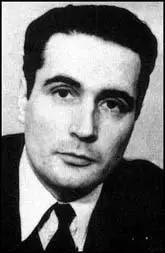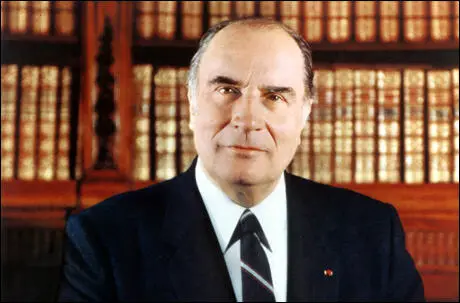Francois Mitterrand

Francois Mitterrand, the fifth child of a stationmaster, was born in Jarnac, France, on 26th October, 1916. An intelligent student Mitterrand studied law and political science at the University of Paris.
On the outbreak of the Second World War Mitterrand joined the French Army but in 1940 he was wounded during Germany's Western Offensive. After being captured he was taken to Germany, but managed to escape in December 1941.
Mitterrand arrived in Vichy in January 1942 and as a strong supporter of Henri-Philippe Petain was given a post in the documentation service of the Legion Francaise des Combattants. However in 1943 he broke with the government over the decision by Pierre Laval to introduce a policy of sending French workers to Germany.
He now joined the French Resistance and began working with the Organization of Armed Resistance (ORA). In November, 1943, he travelled to London where he met General Charles De Gaulle, who put him in charge of unifying the different groups representing former soldiers.
On his return to France in February 1944, Mitterrand became head of Mouvement National Des Prisonniers de Guerre. At the end of the war Mitterrand was given the job of arranging the return of the thousands of French prisoners and deportees that were still in Germany.
In 1946 was elected as a Deputy in the French National Assembly. Between 1947 and 1958 Mitterrand held ministerial posts in 11 short-lived centralists governments.
Mitterrand was opposed to the decision by Charles De Gaulle to create a Fifth Republic. This resulted in him losing his seat in the 1958 elections. His political views now became more radical and in the 1960s he began the task of building up a new, left of centre anti-Gaullist alliance, the Federation of the Left.
Mitterrand returned to the French National Assembly in 1962 and three years later was the Federation's presidential candidate and although achieving 32 per cent of the vote was defeated by Charles De Gaulle.
In 1971 Mitterrand became the leader of the Socialist Party. Over the next few years he embarked on a strategy of electoral union with the Communist Party. This proved highly successful and by 1978 it became the single most popular party in France and in 1981 Mitterrand was elected president.
As president Mitterrand introduced a series of radical economic and political reforms. This included nationalizing financial institutions and several large corporations, raising the minimum wage, improved welfare benefits and abolishing the death penalty. However, after the 1986 elections the Socialist Party lost its National Assembly majority and Mitterrand was forced to work with a right-wing coalition government.

Mitterrand was re-elected president in 1988 and secured another seven year term. As the conservative parties lost their majority, a new left of centre administration was established. Worried by the economic growth of Germany, Mitterrand supported the Treaty of European Union (1991) which aimed at providing a centralized European banking system and a common currency.
In 1992 the Socialist Party suffered a crushing defeat with the right-wing parties winning 484 seats to the left's 92. Three years later Mitterrand lost the presidential election.
Francois Mitterrand died in Paris on 8th January, 1996.

